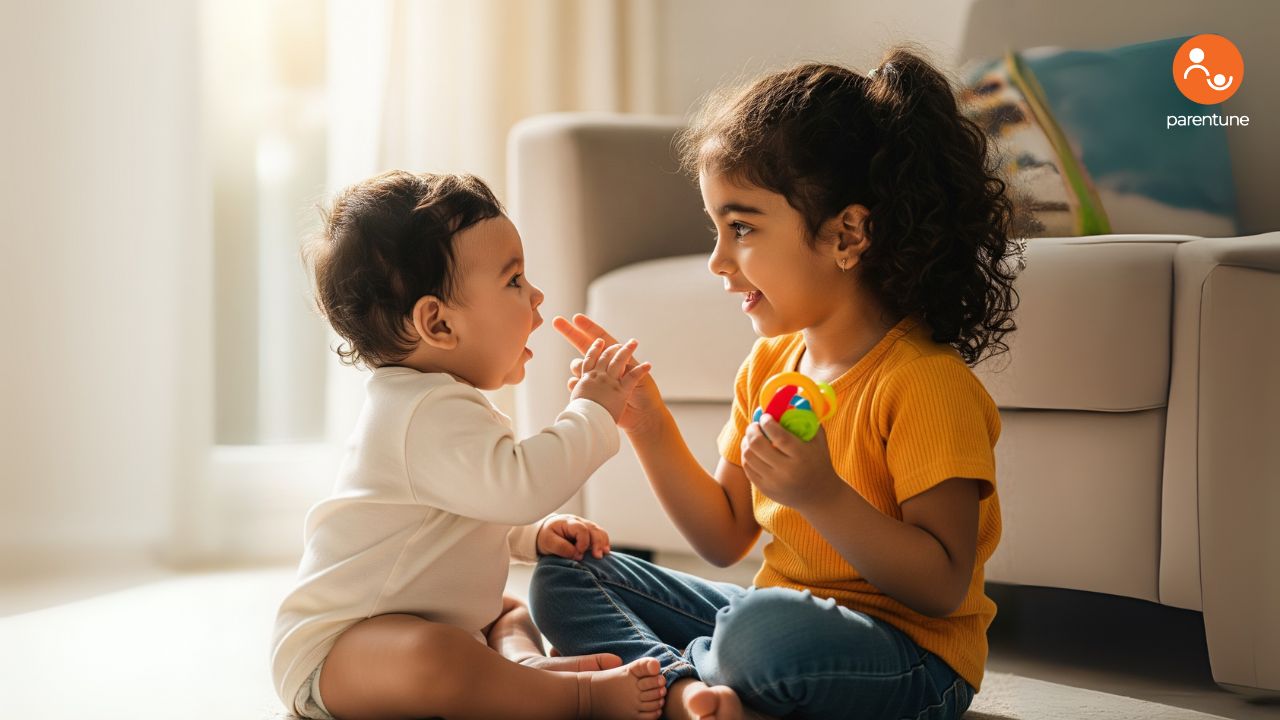speech-&-hearing
When Do Babies Say Mama Or Dada? Language Milestones Explained

Why those first words aren’t just cute—they’re clues.
Every parent waits for the moment.
A quiet room, a curious look, a soft syllable—“Mama?”
Or maybe it’s “Dada,” said while pointing to the ceiling fan. Close enough.
But when exactly does it happen? And what does it mean?
This isn’t just about vocabulary. It’s about connection, cognition, and community. Those first words are the visible tip of a deep developmental iceberg. And knowing what’s typical—and what’s not—can help you tune into what’s happening beneath the surface.
Doctor Q&As from Parents like you
Let’s break down the when, how, and what-if of baby’s first words.
What Counts As A First Word? It’s Not Just The Sound
Before we talk timing, let’s get this clear—not all “Mama”s are created equal.
-
If your baby says “Mama” while reaching for you? That counts.
-
If they say “Mama” while playing with a spoon? That’s babble.
Intent matters.
A true first word is when sound + meaning connect. It’s when “Dada” doesn’t just sound cute—it means something to your child.
It’s the beginning of symbolic thought.
Language.
Memory.
You might find these interesting:
So, When Do Babies Say “Mama” Or “Dada”?
Between 6 and 10 months, many babies start experimenting with sounds—ba-ba, da-da, ma-ma.
But these are just repetitive syllables, not real words yet.
By 10 to 14 months, those sounds often turn into intentional words.
“Mama” starts meaning you.
“Dada” starts meaning that guy who makes silly faces.
Here’s a simple timeline to ground expectations:
-
4–6 months: Babbling begins – vowels and soft consonants
-
6–9 months: Repetitive sounds – ma-ma, ba-ba, da-da (no clear meaning yet)
-
9–12 months: First real words – often “Mama,” “Dada,” or a favorite toy name
-
12–18 months: Vocabulary expands – 5 to 50 words, depending on exposure and personality
Some babies talk early. Others wait. Both are normal.

Why “Dada” Often Comes Before “Mama”
It’s not a popularity contest. It’s phonetics.
“D” is easier to pronounce for little mouths than “M.”
So Dada might show up first—not because they love dad more, but because their mouth can say it sooner.
Don’t take it personally.
Your child’s attachment is built through touch, voice, and routine—not syllables.
Factors That Influence Language Timing
No two babies speak alike. But some factors consistently shape when (and how clearly) those first words emerge.
1. Hearing and Listening Exposure
Language is learned by listening. A baby who hears more speech—especially directed speech—often speaks sooner.
2. Interaction Style
Passive TV doesn’t count.
Responsive conversation—where you pause, wait, and react to your baby’s cues—builds neural connections that accelerate language.
3. Temperament
Some babies are watchers. They understand a lot before saying much. Others are talkers, quick to vocalize.
4. Bilingual Households
Speaking more than one language may delay early speech by a few weeks, but long-term, it’s a cognitive superpower.
5. Sibling Effect
First-borns often get more solo talk-time. Younger siblings might speak later—but understand more thanks to all that background chatter.
Also worth reading:
What If Your Baby Isn’t Saying Anything Yet?
Silence can be part of the process.
But here’s how to check if it’s delayed or just developing:
Green Flags (No Need to Worry Yet)
-
Baby babbles using different sounds (ba, ma, da)
-
Responds to their name
-
Makes eye contact and gestures (like pointing or waving)
-
Understands simple words (“no,” “bye-bye,” “milk”)
Red Flags (Consider Talking to a Doctor)
-
No babbling by 9 months
-
No gestures by 12 months
-
No words by 16 months
-
Doesn’t respond to sound or shows poor eye contact
Remember, you’re not alone in this.
Many parents in the Parentune community have asked these same questions. And they’ve found reassurance in expert-backed advice and stories from fellow moms and dads walking the same road.
How To Encourage Baby’s First Words—Without Forcing It
You don’t need flashcards.
You need attention, interaction, and repetition.
Here’s what actually works:
-
Name what you’re doing: “Mama’s making toast,” “Dada’s getting your bottle.”
-
Pause after a sentence: Leave space. Babies learn turn-taking early.
-
Imitate and exaggerate: Repeat their sounds back with joyful emphasis.
-
Point and label: “That’s your teddy.” “Look, the light.”
-
Sing and read: Songs and rhymes build rhythm and vocabulary together.
Language isn’t a test. It’s a dance.
Your baby doesn’t need to lead every time. They just need you to keep inviting them onto the floor.
Parentune Pro Tip: Don’t Compare—Connect
Scrolling through social media, it’s tempting to track milestones like checkboxes.
“Her baby said ‘Mama’ at 9 months? Mine still just gurgles.”
Pause.
Development isn’t linear—it’s layered.
Some babies walk first. Others talk first. The sequence doesn’t define the outcome.
What matters more is that your child feels heard, seen, and safe to explore their voice—on their own timeline.
That’s where platforms like Parentune come in—offering you both expert insights and parent-to-parent solidarity. Not just milestones, but mindsets that support growth.
Final Word? It's Not Just About Words
When your baby says “Mama” for the first time, it feels like magic.
But it’s actually science.
A culmination of months of brainwork, bonding, and back-and-forth soundplay.
It’s a sign your child is connecting emotion to expression.
And that’s the foundation for everything that comes next—empathy, storytelling, even problem-solving.
So whether it happens at 9 months or 14…
Whether it’s “Dada” or “Baba” or “Nana”…
Celebrate it.
Respond to it.
And trust that behind every syllable, your baby is building something beautiful.
Because language isn’t just what we say.
It’s how we reach for each other.
Be the first to support
Be the first to share
Related Blogs & Vlogs
No related events found.